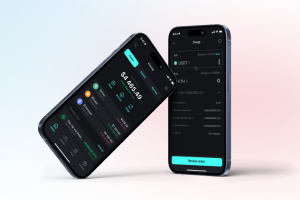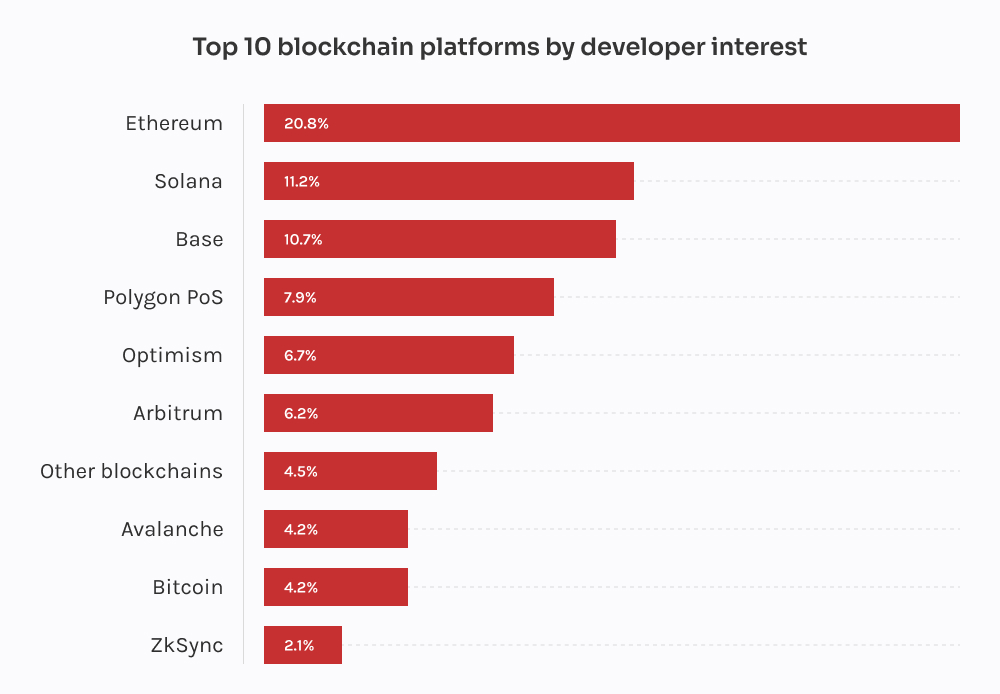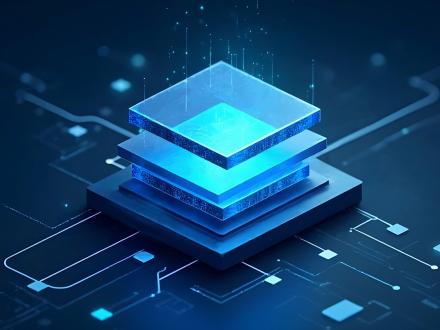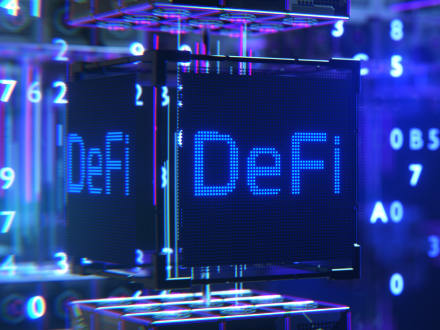Ihre Nachricht wurde gesendet.
Wir werden Ihre Anfrage bearbeiten und uns so schnell wie möglich mit Ihnen in Verbindung setzen.
Das Formular wurde erfolgreich abgeschickt.
Weitere Informationen finden Sie in Ihrem Briefkasten.

Sprache auswählen

Im Jahr 2025 wird Blockchain weiterhin einen Höhenflug erleben – der Markt soll von 2024 bis 2031 jährlich um unglaubliche 66 % von 7,4 Milliarden US-Dollar wachsen. Statistiken wie diese schreien nach einer einfachen Wahrheit: Unternehmen stehen Schlange, um in Blockchain-Technologien zu investieren. Insbesondere in Sektoren wie Finanzen, Lieferkette und Gesundheitswesen. Für diese und andere Bereiche soll Blockchain Rückverfolgbarkeit bringen, die Betriebseffizienz verbessern, Arbeitsabläufe automatisieren, Kosten senken und die Datensicherheit erhöhen.
Mit der wachsenden Bekanntheit von Blockchain steigt auch die Nachfrage danach. Versierte Unternehmen beeilen sich, mit der Entwicklung zu beginnen, stoßen jedoch auf das häufigste Hindernis: Welche Programmiersprache ist die beste? Mein Team und ich haben das schon durchgemacht und wissen aus praktischer Erfahrung, wie schwierig es sein kann, die richtige Blockchain-Programmiersprache auszuwählen. Bleiben Sie bei uns und wir führen Sie durch die wichtigsten zu berücksichtigenden Faktoren, die besten Blockchain-Sprachen für verschiedene Projekte und wie Sie die passende Technologie auswählen.
Die Wahl der Programmiersprachen für die Blockchain-Entwicklung ist entscheidend, da sie sich direkt auf die Skalierbarkeit, Sicherheit und Interoperabilität Ihrer zukünftigen Lösung auswirkt. Die richtigen Blockchain-Programmiersprachen für Ihre Anforderungen bedeuten mehr Transaktionen pro Sekunde, eine bessere Widerstandsfähigkeit gegen Cyberangriffe und eine reibungslosere Kompatibilität mit anderen Apps.
Darüber hinaus beeinflusst die Art der von Ihnen bereitgestellten Lösung die Wahl der Blockchain-Programmiersprachen. Wenn Sie beispielsweise auf Ethereum aufbauen, ist Solidity eine gute Wahl, während Sie sich für Java oder Kotlin entscheiden könnten, wenn Sie eine private Blockchain auf Basis von Hyperledger oder Corda betreiben. Wenn Sie hingegen eine Blockchain-Lösung von Grund auf neu entwickeln, müssen Sie das Framework in Betracht ziehen, das am besten zu Ihren Geschäftsanforderungen und Skalierbarkeitszielen passt. Es ist unnötig zu sagen, dass es viel zu bedenken gibt.

Bei Innowise wählen wir eine Blockchain-Programmiersprache basierend auf den Prioritäten unserer Kunden aus – ob es um schnellere Entwicklung, geringere Anfangsinvestitionen, zusätzliche Finanzierung durch Blockchain-Plattformen, minimierte Risiken, einwandfreie Leistung oder einfache Wartung geht. Hier sind einige weitere Faktoren, die ich bei der Auswahl des Tech-Stacks ebenfalls berücksichtige.
Viele Unternehmen nutzen Blockchain als sicherere Technologie zur Datenspeicherung und Transaktionsnachverfolgung. Daher ist es wichtig, die Schwächen von Blockchain-Programmiersprachen zu berücksichtigen, die ausgenutzt werden können.
Solidity wird zwar häufig verwendet, ist jedoch anfällig für Schwachstellen wie Reentrancy-Angriffe und Gaslimitprobleme. Im Gegensatz dazu bietet eine andere beliebte Sprache, Rust, starke Speichersicherheit und Parallelitätskontrolle, wodurch das Risiko häufiger Fehler verringert wird. Sein Eigentümermodell stellt sicher, dass Fehler zur Kompilierungszeit abgefangen werden, was zur Minderung von Schwachstellen beiträgt und letztendlich zur Schaffung sichererer Blockchain-Systeme beiträgt.
Leistung und Skalierbarkeit sind entscheidende Faktoren beim Entwurf von Blockchain-Lösungen, und die Wahl der Programmiersprache kann der Lösung gewisse Einschränkungen auferlegen.
Aufgrund seiner Garbage Collection kann Go in bestimmten Szenarien eine etwas höhere Latenz aufweisen. Deshalb würden wir es nicht für leistungskritische Anwendungen empfehlen. Auf der anderen Seite bietet Rust Tools und Bibliotheken, die die Latenz drastisch reduzieren können, was es ideal für den Aufbau leistungsstarker, skalierbarer Systeme macht. Darüber hinaus können Entwickler mit der Speicherverwaltungssteuerung von Rust Software schneller erstellen.
Das Ökosystem und die Entwicklerunterstützung können langfristig über den Erfolg eines Projekts entscheiden. Daher empfehlen wir Ihnen, dies auch bei der Auswahl einer Blockchain-Programmiersprache zu berücksichtigen.
Python bietet ein reichhaltiges Ökosystem aus Bibliotheken und Tools und eignet sich daher hervorragend für Aufgaben wie Datenanalyse oder die Integration von maschinellem Lernen. Im Gegensatz dazu haben Nischen-Blockchain-Programmiersprachen wie Vyper kleinere Entwickler-Communitys, was den Support und die Ressourcen, auf die Ihr Projektteam zurückgreifen kann, einschränken könnte.
Ihre zukünftige Blockchain-Lösung wird nicht im luftleeren Raum existieren – Sie werden sie wahrscheinlich benötigen, um Daten mit anderen Systemen auszutauschen – daher sind die Interoperabilitätsfunktionen einer Programmiersprache von entscheidender Bedeutung.
Wenn Sie eine Web3-Integration benötigen, ist JavaScript möglicherweise optimal. JavaScript ermöglicht Ihrer Lösung die nahtlose Interaktion mit dezentralen Netzwerken über Bibliotheken wie web3.js. Die Sprache wird häufig für die Front-End-Entwicklung verwendet und ist daher eine zuverlässige Wahl für die Verbindung dezentraler Anwendungen mit Software-Ökosystemen.
Brauchen Sie Hilfe bei der Auswahl einer Blockchain-Programmiersprache für Ihr Projekt?
Welche Sprachen werden also bei der Blockchain-Entwicklung verwendet und welche ist für Ihr Projekt am besten geeignet? Um Ihnen die Entscheidung zu erleichtern, habe ich eine Liste der wichtigsten Blockchain-Programmiersprachen zusammengestellt, je nach den gängigsten Geschäftsanforderungen.
Solidity ist die bevorzugte Sprache für die Entwicklung von Smart Contracts auf Ethereum und EVM-kompatiblen Chains wie Binance Smart Chain und Avalanche. Sie wird häufig für DeFi-Projekte, DAOs (dezentrale autonome Organisationen) und dApps (dezentrale Anwendungen) verwendet. Solidity bietet zwar umfangreiche Dokumentation und eine große Entwicklerbasis, aber seine Popularität bedeutet auch, dass es bekannte Sicherheitslücken aufweist, die während der Entwicklung behoben werden müssen.
Unser Urteil: Solidity ist zwar eine gute Option für Ethereum-basierte Projekte, DAOs und dApps, Sie sollten sich jedoch vor seinen Sicherheitslücken in Acht nehmen.
Jetzt gewinnt Rust an Bedeutung und wird häufig zur Entwicklung von Blockchain-Lösungen auf Plattformen wie Polkadot, Solana und Near verwendet. Rust ist für seine hohe Sicherheit und Speichersicherheit bekannt und eignet sich gut für Projekte, bei denen Leistung und Zuverlässigkeit im Vordergrund stehen. Bei der Einstellung von Entwicklungsteams kann es jedoch zu Herausforderungen kommen: Die Sprache hat eine steilere Lernkurve und daher eine kleinere Entwicklerbasis.
Unser Urteil: Rust ist eine großartige Wahl für sicherheits- und leistungsorientierte Blockchain-Projekte, aber seine steilere Lernkurve kann es schwieriger machen, erfahrene Entwickler zu finden.
Vyper ist eine Alternative zu Solidity für die Entwicklung von Ethereum-basierten Blockchains. Die Sprache ist auf Einfachheit und Sicherheit ausgelegt: Sie lässt absichtlich einige der komplexeren Funktionen von Solidity weg und reduziert so die potenziellen Angriffsmethoden. Obwohl Vyper nicht so beliebt ist, bietet es eine sicherere Entwicklungsumgebung für diejenigen, die minimale, leicht zu prüfende Smart Contracts erstellen müssen.
Unser Urteil: Vyper bietet eine einfachere und sicherere Option für Ethereum-Smart Contracts, aber seine kleinere Benutzerbasis und die eingeschränkten Funktionen machen es möglicherweise für komplexe Projekte weniger attraktiv.
Unser Urteil: Go ist ideal für den Aufbau skalierbarer Enterprise-Blockchain-Lösungen mit hoher Leistung.
Java und Kotlin bleiben die erste Wahl für private Blockchains, insbesondere bei Plattformen wie Corda und Hedera. Diese Sprachen eignen sich perfekt für die Integration der Blockchain-Technologie in bestehende Unternehmenssysteme, da sie objektorientierte Programmierung stark unterstützen, über ein etabliertes Ökosystem aus Bibliotheken und Frameworks verfügen und über einen größeren Talentpool verfügen.
C++ ist eine leistungsstarke Programmiersprache, die häufig zum Erstellen von EOSIO-basierten Blockchain-Lösungen verwendet wird. Sie hilft beim Einrichten privater Blockchains und beim Implementieren von Smart Contracts, die Geschäftsprozesse automatisieren. Obwohl C++ eine umfassende Kontrolle über Systemressourcen ermöglicht, ist es sehr komplex und erfordert erfahrene Entwickler. Wenn Sie jedoch maximale Blockchain-Leistung in hocheffizienten, ressourcenbeschränkten Umgebungen benötigen, ist C++ eine solide Wahl.
Rust ist eine ideale Sprache zum Erstellen leistungsstarker Layer-1- und Layer-2-Blockchains, wenn Geschwindigkeit und Sicherheit für Sie oberste Priorität haben. Dank der Speichersicherheitsfunktionen und der Parallelitätsunterstützung von Rust eignet es sich perfekt zum Erstellen skalierbarer, robuster Systeme. Blockchains wie Polkadot nutzen Rust, da die Technologie komplexe Transaktionen verarbeiten kann, ohne die Leistung in schnelllebigen Umgebungen zu beeinträchtigen.
Unser Urteil: Rust ist perfekt für skalierbare Blockchains, insbesondere wenn Sicherheit und Geschwindigkeit Priorität haben, erfordert jedoch ein tiefes Verständnis der Sprache vom Entwicklungsteam.
C++ bleibt ein Grundpfeiler bei der Entwicklung zentraler Blockchain-Systeme. C++ wird zum Erstellen von Bitcoin, EOSIO, NEO und anderen Plattformen verwendet und bietet Low-Level-Funktionen, die die Kontrolle und Leistung der Systemressourcen verbessern. Die Sprache eignet sich gut für leistungskritische Blockchains, bei denen eine schnelle Transaktionsverarbeitung und Netzwerksynchronisierung unerlässlich sind.
Python ist einfach zu verwenden und bietet robuste Bibliotheken, was es hervorragend für Blockchain-Prototyping und -Analysen macht. Es wird häufig zum Skripten, Testen und Experimentieren mit Blockchain-Konzepten verwendet, ist jedoch aufgrund von Leistungseinschränkungen in Produktionsumgebungen weniger verbreitet. Die Stärke von Python liegt in seiner Fähigkeit, Ideen schnell zu entwickeln und zu iterieren, was es zu einer guten Wahl für Projekte in den frühen Phasen oder nicht kritische Blockchain-Aufgaben macht.
Wenn Sie eine Backend-Infrastruktur für Ihr Blockchain-Projekt entwickeln müssen, ist Node.js eine gute Wahl, insbesondere für Anwendungen, die eine schnelle, skalierbare und Echtzeit-Transaktionsverarbeitung erfordern. Aufgrund seiner asynchronen, ereignisgesteuerten Architektur eignet sich Node.js gut für die Handhabung zahlreicher gleichzeitiger Verbindungen, wie sie in dApps vorkommen. Es wird jedoch normalerweise nicht für die Kernlogik der Blockchain verwendet.
Unser Urteil: Node.js ist eine ausgezeichnete Backend-Wahl für Blockchain-Anwendungen, die eine schnelle Echtzeitverarbeitung erfordern, aber es ist nicht für die Kernlogik der Blockchain konzipiert.
JavaScript & TypScript
JavaScript, oft kombiniert mit TypeScript für zusätzliche Typsicherheit, ist die Grundlage der Web3-Frontend-Entwicklung. Es unterstützt dApp-UIs und erleichtert die Interaktion mit Smart Contracts über Bibliotheken wie web3.js oder ethers.js. Seine Flexibilität, weit verbreitete Akzeptanz und nahtlose Integration in Blockchain-Netzwerke machen es zur ersten Wahl für Entwickler, die interaktive, benutzerfreundliche Schnittstellen für dezentrale Anwendungen erstellen.
While not typically used for front-end development, Python plays a vital role in blockchain projects that require data analysis and machine learning integration. Python's rich ecosystem of data science libraries, like Pandas and TensorFlow, allows developers to analyze blockchain data, perform predictive analytics, and build machine learning models.
"Die Blockchain-Technologie hat in nur wenigen Jahren große Fortschritte gemacht. Ich kann mit Sicherheit sagen, dass dezentrale Lösungen kein fernes Ziel mehr sind – sie sind für die Art und Weise, wie Unternehmen heute arbeiten, von entscheidender Bedeutung. Wir bei Innowise helfen Unternehmen, sich in dieser spannenden Landschaft zurechtzufinden, indem wir sichere, skalierbare Blockchain-Lösungen entwickeln, die auf ihre individuellen Bedürfnisse zugeschnitten sind. Ob über Ethereum, Hyperledger oder andere Plattformen – wir sind hier, um Ihr Unternehmen mit dieser schnell wachsenden Technologie zu verbinden. Die Zukunft ist dezentralisiert und wir freuen uns, Teil dieser Reise zu sein."

Technischer Direktor bei Innowise
Sie wissen nicht genau, wo Sie mit Ihrem Blockchain-Projekt beginnen sollen?
Um eine endgültige Entscheidung bezüglich der Blockchain-Sprache zu treffen, empfehlen wir, drei weitere Dinge zu berücksichtigen: Analysieren Sie Ihren geschäftlichen Anwendungsfall, überprüfen Sie den Talentpool und stellen Sie die Cross-Chain-Kompatibilität der Lösung sicher.
Wenn Sie sich bei Ihrer Wahl immer noch nicht sicher sind, können Sie jederzeit einen unserer erfahrenen Blockchain-Berater, kontaktieren, die alle Vor- und Nachteile verschiedener Technologien kennen.
Wenn Sie einen Technologie-Stack für Ihre Blockchain-Software planen, empfehlen wir Ihnen, die Programmiersprache anhand ihrer Sicherheit, Leistung, Skalierbarkeit, Ökosystem- und Entwicklerunterstützung sowie Interoperabilität zu bewerten. Außerdem sollten Sie den Hauptanwendungsfall Ihrer Blockchain-Software, den Talentpool, der die Sprache beherrscht, und die Cross-Chain-Kompatibilität berücksichtigen.
Überstürzen Sie also nichts. Wenn Sie die am besten geeignete Programmiersprache für Ihre Blockchain-Lösung auswählen, sollten Sie sich Zeit nehmen und alle Risiken berücksichtigen, die Ihnen dabei drohen können. Wenn Sie Zweifel haben, eine kostengünstige und sichere Blockchain-Programmiersprache auszuwählen, stehen Ihnen die experten von Innowise und ich gerne zur Verfügung. Basierend auf unserer praktischen Erfahrung bei der Bereitstellung kundenspezifischer Blockchain-Lösungen, helfen wir Ihnen, den richtigen Technologie-Stack für Ihr Projekt auszuwählen und umfassende Software zu entwerfen und zu erstellen.













Ihre Nachricht wurde gesendet.
Wir werden Ihre Anfrage bearbeiten und uns so schnell wie möglich mit Ihnen in Verbindung setzen.

Mit der Anmeldung erklären Sie sich mit unseren Datenschutzrichtlinie